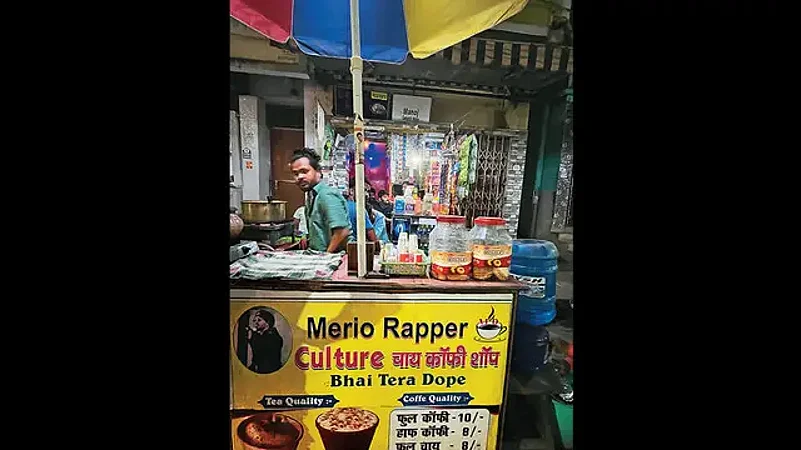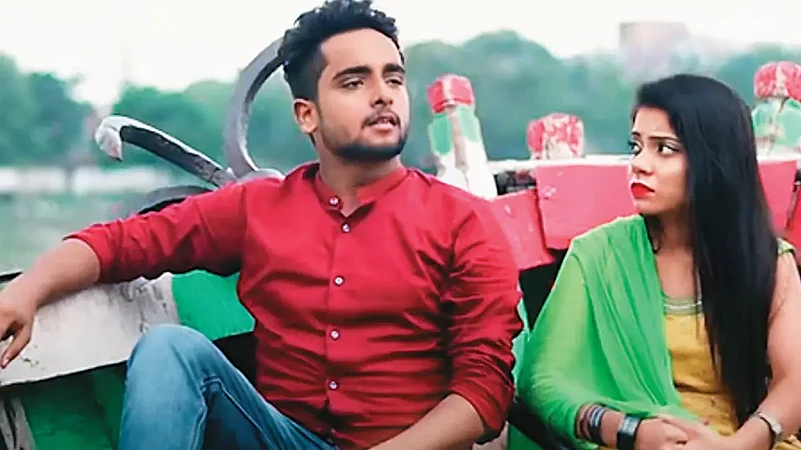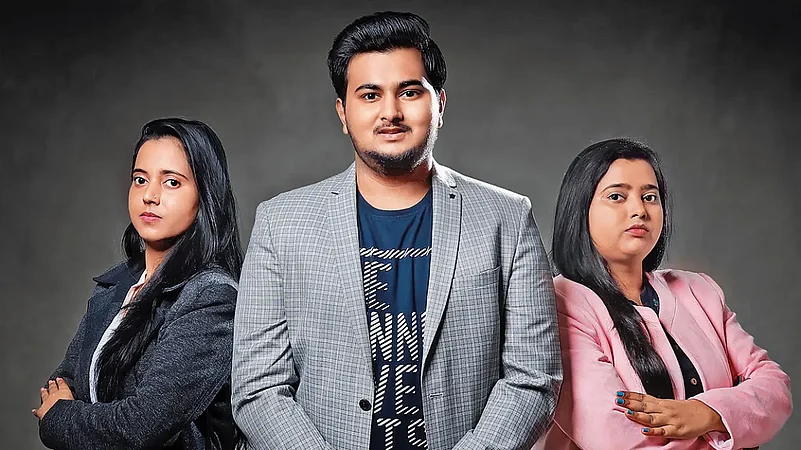Coaching centres and cheap lodges line both sides of the crammed lanes of Musallahpur Haat. Banners and posters occupy every available space—on the walls and strung on plastic wires crisscrossing the lanes. Musallahpur Haat is a place where dreams are sold. Of lucrative government jobs. Thousands of young men and women come from Bihar’s hinterlands to stay, study and dream here—of landing a lower-ranking Group C or Group D job.
On that street with its numerous buildings with their numerous dingy rooms, a young man is telling the stories of these aspirational youth. And the students—the job-seekers—walk out of their windowless rooms in the mornings and the evenings and congregate at this tea-seller’s kiosk to hear him sing about their lives. He calls himself Merio Rapper and says hip-hop is in his soul. He says he gathers pain from the streets and the words flow. One day, the YouTube economy might make it possible for him to become a star. But he is on his way. “I am new and I am learning,” he says. “YouTube is the space for me.” A yellow coloured board has all the information. The price of tea and coffee, etc. The young man sports shoulder-length hair, which he ties in a bun, much like the famous rappers he idolises. “It is meri aur (towards me) and that’s what it is. I tell stories of the contemporary reality of whatever I see,” he adds. That’s his repertoire. This city with its stunted bridges and its young men and women who spend years trying to crack competitive examinations so they can get out of chronic poverty that they are so familiar with. Very few make it.
Before he became Merio, the man was known as Sonu Singh, a civil engineering student in Bahadurgarh, Haryana. But there were financial issues. His parents didn’t make enough in the unorganised sector. Besides, he had a brother and sister to take care of. He returned to Patna and after a few stints as an office boy, opened the chai kiosk around four months ago. Merio has also rented an alley and has painted it in red. It is his studio and storage, with tin cans as stools and some photos of him and a bunch of paintings by a friend. This is where he performs. And of course, there’s always the street out there for him. “Hip-hop is swag,” he says. “And swag is everything.”

ALSO READ: Love: Man, Women And A Viral Story
As a YouTuber, he hasn’t made it to the league of those who are making money but he knows the rules of the game. Merio’s story is that of a YouTuber in the making. A story in transit and a story that can probably put the state’s YouTubers’ narrative in perspective. Poverty is the trigger. But unemployment is even bigger. And in the story of its YouTubers, the story of Bihar’s countless unemployed youth finds a footing.
Merio’s aspirations are those of the city’s. The dilemmas reflected in the haphazard growth where new cafes and apartment complexes are trying to challenge its acute crisis of identity. Patna is a divided place. A part of it is concrete and glass and malls and a part of it is these old houses where the past looks out of the windows at the aspiration that’s claiming the view with all the billboards. There is that old thing of finding a government job. There is this new thing of breaking that format of ambition. For the young men in that lane, Merio is an outlier.

In Merio’s diary, one can see a number of songs about jobs and lives of the students and inflation and the gap between the rich and the poor. His first song when he was very young was about his own life after he had an altercation with his mother. All he wants is his sister to finish her nursing course. He calls his kiosk Merio Culture Coffee Shop. His song Mai Patna Ka Ladka, shot three years ago, has crossed 67,000 views. Three weeks ago, he released yet another video called Top Floor Se. While stories about him posted on YouTube have garnered lakhs of views, Merio feels that his lack of resources had come in the way of him promoting his channel. And that lack itself fuels his creativity. His songbook could be called an archive of longings.

In yet another part of the city, in a new concrete and glass building in the Kankarbagh neighbourhood, three siblings are trying to expand into new digital partnerships and collaborations. Called ArtKala Production, the YouTube channel out of Patna is one of the biggest DIY content-creators in the world. Sneha, Puja and Pawan are the founders of channel which has over 40 lakh subscribers. Their content is mostly about ideas and techniques to repurpose waste materials, like plastic bottles, into decorative pieces or kitchen hacks or even, beauty tips.
Patna is a destination for people from the villages who can’t afford Delhi. And in a way, Patna imbibes that duality. The siblings moved to Patna from Madhubani in 2004 and lived with their grandmother in the Gaighat area in the old city. Their father worked as a switchboard operator in the electricity department and the four siblings knew they had to find jobs. That’s how it was in those days, says Sneha, 27, one of the sisters. While things had never been easy for the family that took out loans to build a house on a small plot of land they had purchased and to fund the eldest daughter’s wedding. The wedding exhausted all their funds, and things began to look even worse.
It manifested itself in the putting off of purchases. Their father would say they will buy it the next time. It was a life of deprivation that they led. Puja, 24, was in school in 2015 when her mother said they didn’t have a penny in the house. That day, Puja and Pawan scrambled together some copper and aluminium wires from the house and went to the scrapyard to sell it. They sold it for Rs 50 and bought potatoes on the way home. That day, Puja felt a little empowered. It wasn’t a lot of money but it was something. They tried other things. They had been desperate. Stringing garlands for weddings was an arduous job. They had done it for a few days and it paid them only Rs 65 for making 144 garlands.

“A waste of time,” says Sneha. “That way we couldn’t have got anywhere.” Puja then started taking tuitions but that didn’t pay much either. They had an old computer and they had heard about online jobs that paid well. They dug into their meagre savings and with that Rs 200, they got an internet card. The first sentence Puja typed on the screen was, ‘how to make money online’. They found data entry jobs and even tried doing a few but they never got paid. Someone in their college told them YouTube could end their misery. So, they searched for how to make money on YouTube. Their brother Pawan was in school and Puja says he had this group of friends who knew graphic designing. Pawan was also very resourceful. They decided to make a video. By then, their father had got a smartphone on EMI. They got some artificial flowers and dispersed the petals. The first video they made had them reassemble the petals, and they posted it on YouTube. At that time, Puja and her sister didn’t even have their own email addresses. They tried to brainstorm a few concepts, like beauty and cooking, but realised they had no money. That’s when they decided to go with recycling and art. Pawan had a Gmail account and they used that to open their YouTube account. “We didn’t know what Facebook or Instagram was,” she says. “We had this old button phone and we weren’t really used to smartphones and this social media world.”
ALSO READ: Theatre Of The Absurd: Reeling In The Droll
The first video was a big hit but a few days later, they saw a few people had watched the video so they decided to post another about making paper flowers that they learned in school in their art and craft class. The third one had Sneha making lamps out of leftover thermocol glasses and plates and they shot the process. They managed to get a few more likes. They decided to name their channel ArtKala because they liked the amalgamation of the two words into one. The fourth video they posted changed their lives. It was around Diwali and they posted a video that had them painting diyas. This was in 2015. They got around Rs 400 as their first earnings and that egged them on. They kept posting their DIY videos and next year, they got more money. “It was a lot and we were able to pay off the loans and slowly, we finished building our house,” Puja says.

For the siblings, it was their circumstances that made them turn into entrepreneurs. The first purchase was an inverter, though. “There were so many power-cuts in our area that we had to make our videos during the day. We decided to solve that issue first,” says Sneha. They bought a camera and started shooting professional videos and kept it simple. The trick that worked was they were still addressing the middle class. They registered their company in 2021 and now employ around 11 people. “We learnt everything online and now we want to launch a platform like Amazon and bring creative minds together in Bihar and other places,” Puja says.
ALSO READ: Punjabi Tadka: Vlogging Their Way To Success
YouTube is now helping over 20 lakh people globally to earn money by making videos and its Partner Program crossed two million creators in its monetisation programme that was launched in May 2007. In 2020, the number of channels joining YPP more than doubled when compared to the year before. “The creator economy in the country has the potential to emerge as a soft power impacting economic growth, job creation, and even cultural influence,” Ajay Vidyasagar, Regional Director, APAC, YouTube Partnerships, had said earlier. India has over 960 million active mobile phone connections, of which 750 million use their phones to access the internet. This makes India the second-largest market globally on both counts, as per government data. Among the many Bihar-based content creators who have been dancing and making entertainment-related content are the sisters Mahi and Manisha, who are dancers in an orchestra and run a YouTube channel out of their rented accommodation in Gopalganj. “We started two years ago and now we are earning money out of it,” says Manisha over phone.
Yet another typical Bihar success story is of Ujjwal Viral Kalakar, a channel run by a young man from Rohtas with more than 5 lakh subscribers and 43.1 million views. Ujjwal Srivastava’s story echoes Bihar’s unemployment crisis—like his web series Ishq E UPSC where he parodies popular film scenes and adapts them to the context. He always wanted to be an actor but growing up in the small village Sheopur in Rohtas, he realised he would have to figure out a way. Ujjwal, 25, first came to Patna to study engineering and then decided to enrol in a mass communication course and started working for a digital news platform. He loved acting but his father had struggled to get him to Patna. He experimented with a few YouTube channels before starting his own web series because he thought YouTube could be the best platform to showcase his acting skills. He had a couple of writers who wrote scripts for him and his Story of a Soldier put him under the spotlight and there was no turning back.
“I am thinking of moving to Delhi and I tell people in Patna that government jobs are not the only way out of poverty. Look at me,” he says. He also built his father a pucca house. “Every day, people come to him with matchmaking proposals. In Bihar, that’s the ultimate mark of success,” says his father. A story in the making, a DIY success story and a viral artist. These are only a few examples. There are a lot more. And every one of them is a unique one. Like Merio says. “It is all about Bihari swag. We do it our own way. And we have our story to tell. About poverty, about no jobs and about innovation. Sab jugaad hai.”
ALSO READ: Otto’s Dilemma: A Short Story From Goa
(This appeared in the print edition as "Channel Surfers")
Chinki Sinha in Patna


























